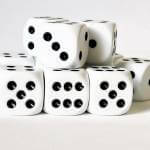Internet gambling is possible thanks to technology, and one significant innovation in that regard is the invention of random number generators. How are the cards in a casino game shuffled and dealt with pay-lines? How are dice thrown, and how does the roulette ball make its way to a pocket? In a live casino, the dealers, shooters, and croupiers perform these actions right before our eyes. We witness the events as they happen by chance. But in a virtual casino, how does this play out? More importantly, how do you know that you’ve been given a fair shot? Random Number Generators (RNGs) are the answer.
RNG Explained
A random number generator is a program that produces numbers at random using mathematical algorithms. RNGs had long been implemented in scientific simulations before making their way to the casino gambling scene. There are numerous kinds, but the one used at online casinos is called a pseudo-random number generator. Pseudo RNGs only require an algorithm and a seed number to generate an output, thereby eliminating the need to input data or external numbers.
The goal is to recreate the experience of playing in a live casino, so the RNG attempts to mimic real-life odds, where every outcome is a result of chance. With unpredictable outcomes, games are fair to everyone. For players, it means the RNG doesn’t react to how much you’ve won or lost or the amount of cash you have left. Neither does it recognize if you’re due for a jackpot or not. It’s this randomness that makes gameplay thrilling and fun. Of course, a random outcome could mean a big win on a lucky bet.
How The Casino RNG Functions in Practice?
When spinning the reels on a slot machine, for instance, you’re most likely occupied with the gameplay and excitement exploding on the screen. But behind all that is an intricate process that is continuously in motion. We’ll be taking the simple route to explain how the casino RNG works because technically, there is a lot of advanced calculation that would probably confuse us all.
The seed number is where it all begins, as the algorithm will produce a random output based on the initial seed. The output is a numerical value that translates to a game outcome. It could be the reel position after a spin or the number that a die lands on. That outcome then becomes the new seed number for the next event, and the trend continues.
A familiar doubt for many players is the safety or dependability of RNGs. What guarantee is there that the program can’t be hacked?
Even though there is a pattern to the process, the only way to hack the system would be to know the initial seed number. That is practically impossible as the value is a heavily guarded secret and is usually about 219,937 digits long.

RNGs in Slots
Slots were the first casino game to use RNGs. As the number of reels and paylines increased, so did the possible outcomes. Decades ago, when slots were still mechanized devices with only three reels, pulling on the handle would set the system of gears and levers in motions. It would come to an end as the handle slowly moved back in place. Different reel combinations were achieved in this manner. Fast forward to the present day, and computerized slot machines use RNGs in place of gears, levers, and brakes.
Generally, casinos will represent all the symbols on a slot with a particular number. Imagine a 5 reel video slot with 10 symbols per reel. Each character is represented by values 1 – 10. The RNG will produce a number within that range for each of the five reels, and a winning combination is formed when the five random numbers land on an active payline.
The RNG chip continues the process of creating random outcomes even while the reels remain inactive.
RNGs in Casino Games
The best online casino games all use RNGs. Each game RNG triggers outcomes in a different way. However, just like slots, numbers are constantly running and rapidly changing, and a random value will determine the result of each action you make.
Consider a game of blackjack where the goal is to beat the dealer’s hand without going bust. Before the game starts, millions of numbers are being generated continuously within the mechanism. Imagine the numbers falling endlessly from top to bottom. Every number is assigned to a card or hand value. When you press the “Deal” button, the number within sight at that very instant is captured, so to speak, and that determines the card that you receive.
RNGs and The Concept of FairPlay
Are RNGs fair? Fairness as a term signifies that every event gets an equal chance of happening, and randomness should imply fairness. But these programs are designed by humans, and algorithms are fixed, so RNGs cannot be considered entirely random. They may be safe from hacking, but what stops the casino from manipulating the results to their favor. In the past, a company called BLR Software was discovered to have rigged its games for a higher house advantage on the “World Wide Wagering” casino site. And there is the infamous tale of Ron Harris, who developed a program that could determine the outcomes of RNGs in 2008.
Casino licensing is the greatest assurance that an RNG is fair. That is why the safest guarantee of fair play is to play at licensed online casino sites. The top international licensing organizations include:
- The UK Gambling Commission (UKGC)
- The Malta Gaming Authority (MGA)
- Curacao Gaming Authority, among others.
Licensed sites, according to gambling regulations, need to have their gaming software audited regularly. They enlist the services of third party agencies on a monthly, quarterly, or bi-annual basis. These independent auditors test not only RNGs but also payout percentages. They also perform poker audits, live dealer evaluations, and full security checks, and the casino will display the certificate of fairness on their site. The regulations regarding RNGs are stringent. Casinos are not allowed to make any alterations to the program without first notifying the relevant body. In fact, state-run casinos have to get approval from the state, after which inspectors will carry out new checks for randomness. The top accredited testing agencies are:
eCOGRA – “eCommerce and Online Gaming Regulation and Assurance” was founded in 2003 and swiftly became the most sought after independent auditing service in the industry. They offer jurisdiction approvals, security reviews, and RNG data analysis by specialist engineers, among other services.
TST – Technical Systems Testing (TST) is a GLI company, and the latter has been an approved game testing service provider since 1989. TST itself was created in 1993 and follows its parent company’s quality standard, carrying out the strict casino and sportsbook audits in compliance with international regulations.
iTech Labs – This independent casino game testing company provides audit services for all software-based gambling games, including casino games, lotteries, live dealer games, and more. With a history of working with the biggest names in the business, iTech Labs has earned its keep and continues to certify only the safest and most reliable casinos.
Gaming Associates – A top consultant that sprung up alongside the birth of the iGaming industry, Gaming Associates has been in operation since the ’90s. Their services span a broad spectrum that comprises fairness, security, and legalities. They provide checks for operators, vendors, regulators, as well as investors.
Does Every Casino Game Use An RNG?
We’ve established that RNGs are designed to allow fair and random outcomes. By implication, a casino game without a random number generator would have predictable results. Fortunately, this is not the case. Not every casino game uses an RNG, because not all games have to. RNGs are a virtual replacement for real-life croupiers, so live games with human dealers do not have random number generators.
The salient point of live casinos is transparency. Players question online casino game results because they are left in the dark, figuratively. After consecutive losses, it is natural to wonder if the casino is making you lose on purpose – they are profit inclined after all.
In contrast, a player who goes broke in a live casino will probably attribute it to a string of bad luck. You get to see each move play out, so you have no doubts that every outcome is determined by chance. Live dealer game providers, nowadays, stream with the latest high-resolution cameras from multiple angles. So players have a 3D view of the table, cards, and the dealer from all sides.
Conclusion
A random number generator is only as fair as the casino that operates it, so play at a licensed site to rest assured of fair play on your favorite games. If you can’t see a certificate of licensing or a logo from an independent auditor, then you should be playing somewhere else. There are many illegitimate casinos, but luckily there are just as many trustworthy ones. A reliable RNG is indispensable to get the best out of your experience and – although there isn’t a direct connection – better value for your money.






